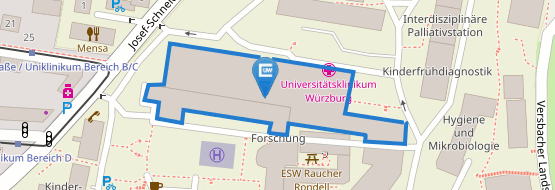Mass Spectrometry
Mass Spectrometry
Contact:
Dr. Andreas Schlosser
andreas.schlosser@uni-wuerzburg.de
Tel.: +49 0931-31-86888
or:
Stephanie Lamer
stephanie.lamer@uni-wuerzburg.de
Tel.: +49 0931-31-89624
The following mass spectrometry-based methods and applications are available for all groups of the Rudolf Virchow Center. Upon request, analyses can also be performed for other labs of the University of Würzburg and for the University Hospital, as a collaboration or service projects.
Interactome Analyses
Specific protein interactors can be identified from CoIP samples. Quantitative mass spectrometric methods (label-free, SILAC, N15 labeling) allow to distinguish between specific interactors and unspecific contaminants.
Analysis of Posttranslational Modifications (PTMs)
Identification, localization and quantification of PTMs, such as phosphorylation (enrichment of phosphopeptides with TiO2 can be performed), ubiquitylation, SUMO, acetylation, methylation, ADP-ribosylation and GlcNAc. The accurate position-specific degree of acetylation at lysine residues (e.g. histones) can be determined by Fragment Ion Patchwork Quantification (ElBashir R et al., 2015).
Quantitative Proteomics
Global quantitative proteomics can be performed either label-free or by applying stable isotope labeling (SILAC or N15 labeling). PulsedSILAC analyses can also be performed.
Identification of HLA peptides
Isolation of HLA peptides via anti-HLA antibody, mass spectrometric analysis, de novo sequencing, NetMHC analysis
De Novo Sequencing of Monoclonal Antibodies
The sequence of monoclonal antibodies can be determined by de novo sequencing. Heavy and light chain are digested separately with a set of different proteases, and different mass spectrometric fragmentation techniques are applied (HCD & ETD). EThcD even often allows to distinguish between Leu and Ile.
The following nanoLC-coupled ESI-MS/MS systems are available
- Orbitrap Velos Pro (Thermo Scientific)
- Orbitrap Fusion ETD (Thermo Scientific)
Both systems are coupled to a nEASY LC1000 (Thermo Scientific). Peptide separation is performed by C-18 reversed phase chromatography.
The Orbitrap Fusion offers ETD fragmentation. This is especially useful for PTM analyses and de novo sequencing.




